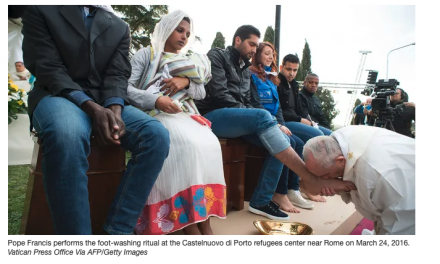First Reading – Isaiah 52:7-10
Responsorial Psalm – Psalm 98: 1, 2-3, 3-4, 5-6
Second Reading – Hebrews 1:1-6
I recently had the chance to hear Handel’s Messiah in-person for the first time at a performance by the Milwaukee Symphony Orchestra. The music is remarkable, as anyone who has heard the most famous pieces, such as the “Hallelujah” or “Unto Us a Child is Born,” can attest. What I was most struck by, however, was the majesty Handel injected into the oratorio.
The music moves through some major themes in salvation history, from the promise of a Messiah to the mystery of the Incarnation and the triumph of the Resurrection. And, befitting such profound and consequential themes, the music crescendos in ways that leave one in awe of the work of God. (On this point, it is notable that all the lyrics are from the Bible, so it truly is about calling attention to the work of God.)
I mention this all here because the readings for the liturgy on Christmas Day represent a similar awe-inspiring crescendo. After the waiting of Advent and the preparatory prayers of the last four Sundays, we are finally in a position to participate in a full-throated celebration of the transformative grace of God.
The first reading from the Book of Isaiah, for instance, celebrates the majesty of God’s restoration of Israel. After years of exile, the people finally have their long-awaited victory, “for they see directly, before their eyes, the Lord restoring Zion.”
We can hear the triumph in prophet’s words: “Hark! Your sentinels raise a cry, together they shout for joy.”
The responsorial psalm underscores that this triumph is not unique to the people of ancient Israel, but rather belongs to the whole human race as a result of God’s gift in the Incarnation. “All the ends of the earth,” the Psalm proclaims (with emphasis added), “have seen the saving power of God.”
The second reading from the Book of Hebrews, meanwhile, helps us appreciate why this should be the case, for at the Nativity of Our Lord we moved from celebrating the work of God through divine agents to experiencing the work of God’s very self in the world through the gift of the Son of God. Jesus is, therefore, “far superior to the angels, as the name he has inherited is more excellent than theirs.”
This is not a popularity contest, though. The claim about excellence is meant to convey that Jesus is able to do more than any angel, mighty as they are. He is the one who, by the end of his earthly life will have “accomplished purification from sins,” a gift offered to all, for we have all sinned and fallen short of the glory for which God has created us.
The greatest crescendo of all, however, is in the Gospel, when we hear
“And the Word became flesh and made his dwelling among us, and we saw his glory, the glory as of the Father’s only Son, full of grace and truth.”
This is the heart of our Catholic faith, the conviction that sets all Christians apart, for we believe that God became human in the lowliest of fashions, over 2000 years ago. And, we believe, the world was forever transformed as a result of that birth.
I hope, this Christmas, we can take a moment to more fully appreciate the profound depth of that conviction, so that we can feel in our very core the majesty and awe of the Incarnation. After all our waiting and preparation, we celebrate that God is with us, a light shattering our darkness.
Hopefully, the readings in this liturgy will give us the great crescendo to which we have been building. If you need a little help to feel the oomph, though, might I suggest a rousing rendition of some of Handel’s Messiah?





